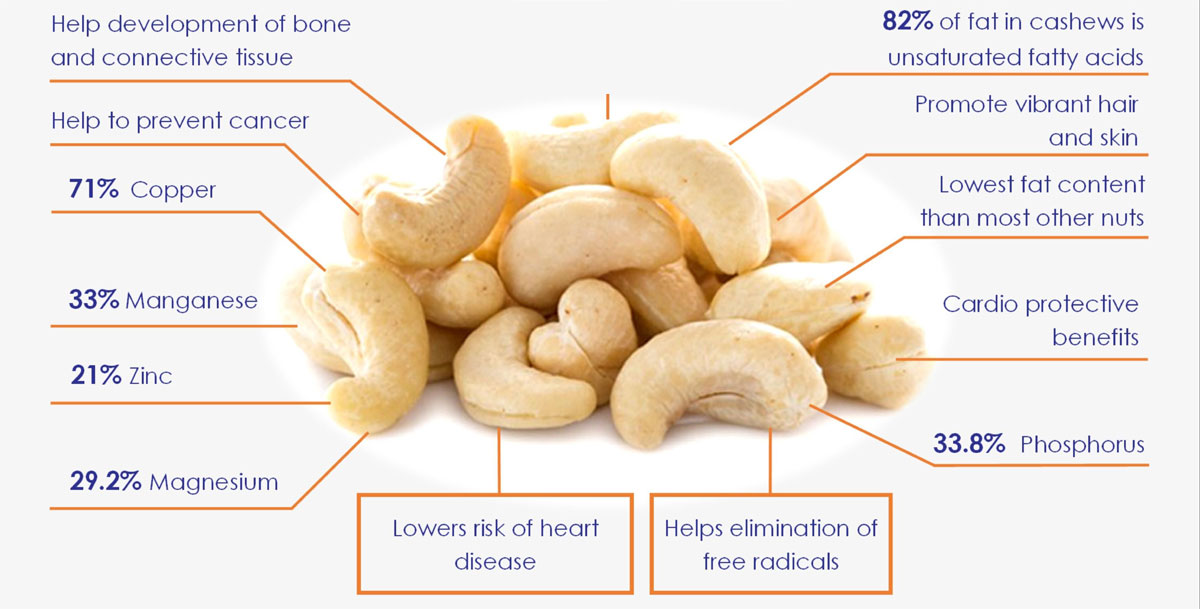Cashew Nuts Health Benefits
Cashew Nuts Health Benefits
Cashew nuts are not just a tasty snack; they also offer a wide range of health benefits. Rich in essential nutrients and antioxidants, cashews can support your overall well-being and provide various advantages for different aspects of your health. From improving heart health to boosting brain function and aiding in weight management, here’s a closer look at the health benefits of cashew nuts.
Heart Health
One of the most notable benefits of cashew nuts is their positive impact on heart health. Cashews are rich in healthy fats, specifically monounsaturated and polyunsaturated fats, which have been shown to help reduce bad cholesterol levels (LDL) while increasing good cholesterol levels (HDL). These heart-healthy fats, combined with an impressive mineral profile that includes magnesium and potassium, contribute to maintaining healthy blood pressure levels. In turn, this can reduce the risk of hypertension and provide protection against cardiovascular diseases.
Brain Function
Another compelling reason to incorporate cashews into your diet is their potential cognitive benefits. Cashews are an excellent source of magnesium, which plays a crucial role in brain function. Magnesium supports the healthy development and maintenance of nerve cells, helping to enhance memory and learning capabilities. Additionally, cashews contain antioxidants, such as vitamin E, that can help protect the brain against oxidative stress and age-related cognitive decline.
Weight Management
Contrary to popular belief, cashews can be a beneficial addition to a weight loss or weight management diet. While they are relatively high in calories, cashews are also incredibly satisfying and rich in fiber and protein. Including moderate portions of cashews in your meals or snacks can help curb cravings and keep you feeling full for longer periods. This can prevent overeating and support your weight management efforts. Additionally, the healthy fats in cashews may improve your body’s ability to absorb fat-soluble vitamins, further supporting overall health.
Bone Health
Cashews provide several essential minerals that contribute to optimal bone health. They are a good source of calcium, which is widely known for its role in maintaining strong and healthy bones. Cashews also contain magnesium, another mineral crucial for bone health, as it plays a key role in bone formation and maintenance. Additionally, cashews provide potassium, which supports proper mineral balance and prevents the loss of calcium through the urine.
Digestive Health
Including cashews in your diet can also promote a healthy digestive system. Cashews are a good source of dietary fiber, which aids in digestion and prevents constipation. Fiber adds bulk to your stool, facilitating bowel movements and promoting regularity. Additionally, the healthy fats in cashews can help lubricate the intestines, further supporting smooth digestion.
Antioxidant Properties
Cashews boast an impressive array of antioxidants that help protect your body against oxidative stress caused by free radicals. These antioxidants include vitamins E and K, as well as trace minerals like copper and selenium. Antioxidants play a crucial role in neutralizing free radicals, which can lead to chronic inflammation and serious health conditions. By regularly consuming cashews and other antioxidant-rich foods, you can support your body’s defense against these harmful compounds.
Frequently Asked Questions
1.Are cashews good for weight loss?
Yes, cashews can be beneficial for weight loss. While they are calorie-dense, cashews are also rich in fiber and protein, which can help keep you feeling full and satisfied. Including moderate portions of cashews in your diet can prevent overeating and support your weight management efforts.
2.Can cashews lower cholesterol levels?
Cashews can contribute to lowering cholesterol levels. They are rich in healthy fats, specifically monounsaturated and polyunsaturated fats, which have been shown to reduce bad cholesterol (LDL) levels and increase good cholesterol (HDL) levels. Including cashews in a balanced diet can support heart health and help manage cholesterol levels.
3.Can cashews help with diabetes?
Cashews can be a suitable snack option for individuals with diabetes. They have a low glycemic index, which means they have a minimal impact on blood sugar levels. The combination of healthy fats, protein, and fiber in cashews can help regulate blood sugar levels and prevent spikes and crashes. However, it’s essential to consume them in moderation as part of a well-balanced diet.
Final Thoughts
Incorporating cashews into your diet can offer a myriad of health benefits. From supporting heart health and brain function to aiding in weight management and promoting bone health, these delicious nuts pack a nutritional punch. However, it’s important to remember that while cashews provide many advantages, they should be consumed in moderation as part of a well-rounded diet. Including a variety of nuts and other nutritious foods in your meals will ensure you receive a wide range of essential nutrients to support your overall well-being. So go ahead and enjoy a handful of cashews as a healthy snack or add them to your favorite dishes for that extra boost of nutrition!







